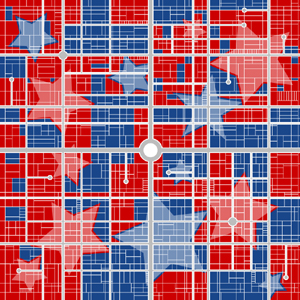In unusual split, SCOTUS finds no standing in racial gerrymandering case

The U.S. Supreme Court ruled Monday that Virginia’s House of Delegates did not have standing to represent the state’s interests in a racial redistricting case.
Justice Ruth Bader Ginsburg wrote the majority opinion, joined by Justices Clarence Thomas, Sonia Sotomayor, Elena Kagan and Neil M. Gorsuch. SCOTUSblog and the Washington Post had early coverage.
The court ruled in an appeal challenging the constitutionality of 11 state legislative districts in Virginia that were drawn in 2011 to maintain a black voting-age population of at least 55 percent.
The standing decision could give an election advantage to Virginia Democrats, according to the Washington Post.
The challenge was brought by voters in 12 redrawn districts in the Virginia House of Delegates. The House and its speaker intervened as defendants to defend the constitutionality of the challenged districts.
A special district court panel of three judges ruled that 11 districts had unconstitutionally sorted voters based on race. Virginia’s attorney general declined to appeal, but the House continued the litigation when it asked the U.S. Supreme Court to hear the case.
The special court ordered an outside expert to draw a new map after the state did not act, according to the Washington Post. The new map puts six Republican delegates in Democratic-majority districts.
In her majority opinion, Ginsburg said the House lacks authority to displace the Virginia attorney general to represent the state in the Supreme Court appeal.
“Virginia would rather stop than fight on,” Ginsburg wrote. “One House of its bicameral legislature cannot alone continue the litigation against the will of its partners in the legislative process.”
Nor does the House have standing to appeal in its own right, Ginsburg said, because it suffered no injury. “Though redrawing district lines indeed may affect the membership of the chamber, the House as an institution has no cognizable interest in the identity of its members,” Ginsburg wrote.
Justice Samuel A. Alito Jr. dissented in an opinion joined by Chief Justice John G. Roberts Jr. and Justices Stephen G. Breyer and Brett M. Kavanaugh.
Alito argued that the House did suffer harm required for standing.
“Districting matters because it has institutional and legislative consequences,” Alito wrote. “To suggest otherwise, to argue that substituting one plan for another has no effect on the work or output of the legislative body whose districts are changed, would really be quite astounding. If the selection of a districting plan did not alter what the legislative body does, why would there be such pitched battles over redistricting efforts?”
The case is Virginia House of Delegates v. Bethune-Hill.



